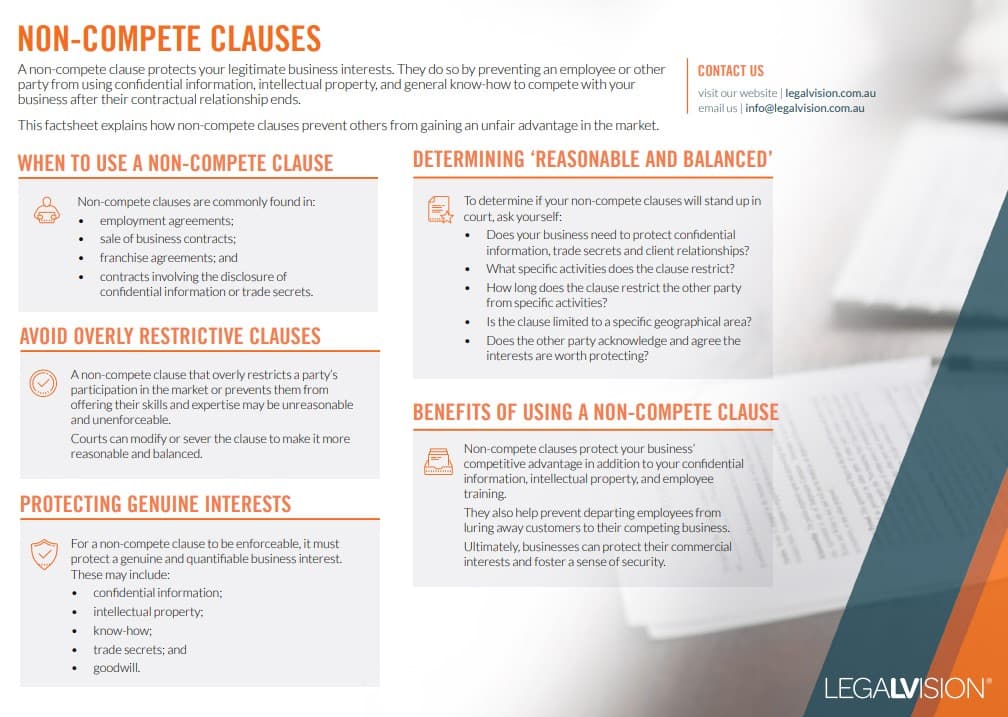In Short
- Restraint of trade clauses protect your business from competitors and prevent client poaching.
- Common restraints include non-compete, non-solicitation, and non-dealing clauses.
- These clauses must be reasonable to be enforceable under Australian law.
Tips for Businesses
When including restraint of trade clauses in your agreements, ensure they are reasonable in scope and duration. Tailor them to your specific business needs to avoid challenges in court. Seek legal advice to draft or review your clauses to ensure enforceability.
On this page
As a labour-hire company owner, you understand better than most the importance of limiting your employees’ actions both during the term of the engagement and after termination. Your employees hold a position of privilege and power, being entrusted not only with sensitive business information and processes, but also with your clients’ confidential information. Consequently, it is imperative to institute measures to safeguard against former employees who may seek to exploit your business for their personal gain. This article will explain the restraint of trade clauses available to you as the operator of a labour-hire business.
Types of Clauses
Implementing restraint of trade clauses is a simple way to prevent your current and former employees from engaging in certain conduct for a specific period of time. The main types of restraint of trade clauses available to you are:
- non-competition clauses and non-solicitation clauses;
- exclusive service clauses; and
- garden leave clauses.
Each of these clauses is outlined in further detail below.
1. Non-Competition and Non-Solicitation Clauses
Non-competition and non-solicitation clauses purport to prevent employees from competing with you during and after the termination of their employment. They can guard against any:
- solicitation and poaching of clients and or customer connections;
- solicitation and poaching of current employees;
- disclosure of trade secrets and other types of confidential information; and
- general activity directly in competition with your business.
It is important to understand that not all restraint of trade clauses are the same, particularly regarding non-competition and non-solicitation clauses. These clauses will be upheld in court only if they are reasonable and intended to protect a legitimate business interest. The court will decide by considering the scope and length of the restraint, along with other factors.
It is essential to include such restraint clauses in employment contracts with workers and labour agreements with host businesses to ensure legal compliance and protection of business interests.
A well-drafted restraint clause will typically be ‘cascading’ in nature. A cascading time and distance clause may look like this:
| Time | Distance |
| (a) Six months; or | (a) Australia; or |
| (b) Four months; or | (b) New South Wales; or |
| (c) Two months. | (c) Sydney. |
If you seek to enforce the restraint of trade, the court will consider the most reasonable option from the clause and strike out all others. This ensures the highest level of enforceability of the clause in circumstances where the clauses are generally considered void at first instance as a matter of public policy.
2. Exclusive Service Clauses
Exclusive service clauses require an employee to provide services exclusively to you. This is especially important for labour-hire companies, as you want to prevent your employees from working for other labour-hire companies or the host businesses directly.
As mentioned earlier, any restraint of trade clauses will be considered invalid unless reasonable. This is especially important regarding exclusive service clauses because they limit an employee’s ability to make a living. As such, it is essential that such a clause be drafted with sufficient particularity and flexibility; otherwise, it will be found to be unenforceable.

This factsheet explains how non-compete clauses prevent others from gaining an unfair advantage in the market.
3. Garden Leave Clauses
Including garden leave clauses empowers employers to restrict a departing employee from entering the workplace or undertaking client-facing work during their notice period. Unlike restraint of trade clauses, garden leave provisions distinctly prohibit employees from accessing work premises while they remain employed by you. This is to prevent them from:
- stealing confidential information;
- poaching clients or employees; and
- undertaking activities to sabotage your work processes.
Within the context of a labour-hire agreement, the implementation of a garden leave clause carries notable benefits, most notably in impeding the employee from attaining the contact details of host organisations and pursuing employment opportunities with them. Moreover, the provision prescribes a designated period during which the employee cannot in activities with competitors or the host business.
Key Takeaways
Restraint of trade clauses are invaluable tools that allow labour hire companies to maintain a stable workforce, grow their customer connections and securely protect their confidential information. The key types of restraint clauses you may wish to consider for your labour hire business include:
- non-competition clauses and non-solicitation clauses;
- exclusive service clauses; and
- garden leave clauses.
If you are drafting restraint of trade clauses, our experienced employment lawyers can assist as part of our LegalVision membership. For a low monthly fee, you will have unlimited access to lawyers to answer your questions and draft and review your documents. Call us today on 1300 544 755 or visit our membership page.
Continue reading this article below the formFrequently Asked Questions
The types of restraint of trade clauses available to labour-hire companies are non-competition clauses and non-solicitation clauses, exclusive service clauses and garden leave clauses. Each of these restraint of trade clauses is an easy way to prevent your current and past employees from certain conduct for a period of time.
Non-competition and non-solicitation clauses purport to prevent employees from competing with you during and after the termination of their employment and guard against the solicitation and poaching of your clients, customers or workers. Additionally, these clauses can protect against the disclosure of trade secrets and other types of confidential information and general activity directly in competition with your business.
We appreciate your feedback – your submission has been successfully received.











